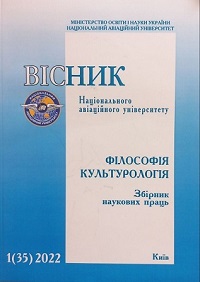ЕКЗИСТЕНЦІАЛІСТСЬКИЙ ФЕМІНІЗМ СІМОНИ ДЕ БОВУАР
DOI:
https://doi.org/10.18372/2412-2157.35.16542Ключові слова:
фемінізм, екзистенціалізм, Сімона де Бовуар, екзистенціалістський фемінізм, феміністська думка, екзистантАнотація
У статті розглядаються філософські погляди видатної письменниці та ідеологині феміністського руху
Сімони де Бовуар як екзистенціалістський фемінізм. Аналізується внесок авторки у розвиток «фемінності» як
відкриття феномену «іншої», визначення його як певного психологічного комплексу неповноцінності, та спроби
вказати шлях до ймовірної подальшої самореалізації жінки. Розкривається інтерпретація письменницею історії у
світлі екзистенціальної філософії, де жінка, через художній образ, вивчається авторкою як екзистант, провідним
сенсом буття якої є прагнення до творчої та особистісної самореалізації. Обґрунтовується, що саме у цьому
твердженні і розкривається основний сенс поняття екзистенціалістського фемінізму Сімони де Бовуар.
Посилання
Zephir J. Le Néoféminismede Simone de Beauvoir / J. Zephir. – Paris: Denoѐl-Gonthier, 1982. – 420 p.
Абсолютные истины Симоны де Бовуар [Електронний ресурс]. – Режим доступу: http://www.vokrugsveta.ru/vs/article/6229/
Агеєва В. Філософія жіночого існування / В. Агеєва // де Бовуар С. Друга стать; пер. з франц. Воробйова Н., Воробйов П., Собко Я. – в 2 т. – К. : Основи, 1994. – Т. 1. –С. 5-21.
Айвазова С. Симона де Бовуар : этика подлинного существования / С. Айвазова. – М.: Прогресс, 1997. – 197 с.
Бовуар С. де Друга стать : У 2 т. / С. де Бовуар; пер. с франц. Н. Воробйової, П. Воробйова. –Т. 1. – К. : Основи, 1994. – 390 с.
Бовуар С. де Друга стать: У 2 т. / С. де Бовуар; пер. с франц. Н. Воробйової, П. Воробйова. –Т. 2. – К. : Основи, 1994. – 392 с.
Downloads
Опубліковано
Версії
- 2023-07-20 (2)
- 2022-08-12 (1)


